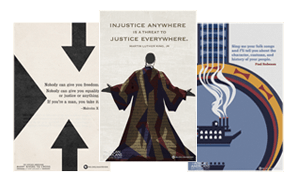Black is Beautiful
Afros, Soul Train and Self-Love
“Black is Beautiful” came out of the Black Power movement. But it quickly permeated the American cultural mainstream in the adoption of the Afro hairstyle and Afro-centric fashion. Blackness, or “soul,” became the epitome of cool in popular films, music and advertising. By 1969 there were black characters on 21 prime time tv shows.
But more than any other program, the syndicated television show Soul Train, created and hosted by visionary entrepreneur Don Cornelius, helped spread the idea that black was beautiful. Soul Train brought black music, dancing, and fashion into homes across America. For African-American youth, it was a revelation to see kids like themselves on national television.
Musician Ahmir “Questlove” Thompson watched it as a child. He remembers, “Soul Train was pretty much the obsession in every household in my neighborhood. I guess you could say Soul Train was kind of the first non-minstrel-based black entertainment that America really got.”
Soul Train and its sponsors advertised products for black consumers in ways that appealed to their new pride and identity.
“Don Cornelius used the commercials to educate and promote Afrocentricity, which was something that was absolutely not heard of,” says Questlove of the time.
Questlove goes on to assert that Don Cornelius’ master plan was to change the lives of black youth without them knowing it.
“I don’t mean it lightly when I say that self-love was probably the most important lesson that was taught on the show.”
Afros, Soul Train and Self-Love
“Black is Beautiful” came out of the Black Power movement. But it quickly permeated the American cultural mainstream in the adoption of the Afro hairstyle and Afro-centric fashion. Blackness, or “soul,” became the epitome of cool in popular films, music and advertising. By 1969 there were black characters on 21 prime time tv shows.
But more than any other program, the syndicated television show Soul Train, created and hosted by visionary entrepreneur Don Cornelius, helped spread the idea that black was beautiful. Soul Train brought black music, dancing, and fashion into homes across America. For African-American youth, it was a revelation to see kids like themselves on national television.
Musician Ahmir “Questlove” Thompson watched it as a child. He remembers, “Soul Train was pretty much the obsession in every household in my neighborhood. I guess you could say Soul Train was kind of the first non-minstrel-based black entertainment that America really got.”
Soul Train and its sponsors advertised products for black consumers in ways that appealed to their new pride and identity.
“Don Cornelius used the commercials to educate and promote Afrocentricity, which was something that was absolutely not heard of,” says Questlove of the time.
Questlove goes on to assert that Don Cornelius’ master plan was to change the lives of black youth without them knowing it.
“I don’t mean it lightly when I say that self-love was probably the most important lesson that was taught on the show.”
Find educational resources related to this program - and access to thousands of curriculum-targeted digital resources for the classroom at PBS LearningMedia.
Visit PBS Learning Media






